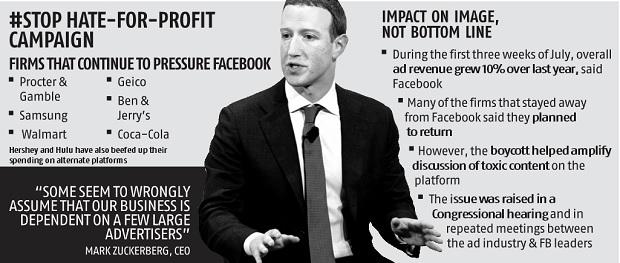The advertiser boycott of Fb took a toll on the social media large, however it could have prompted extra harm to the corporate’s status than to its backside line.
The boycott, known as #StopHateForProfit by the civil rights teams that organised it, urged corporations to cease paying for advertisements on Fb in July to protest the platform’s dealing with of hate speech and misinformation. Greater than 1,000 advertisers publicly joined, out of a complete pool of greater than 9 million, whereas others quietly scaled again their spending.
The 100 advertisers that spent probably the most on Fb within the first half of the yr spent $221.four million from July 1 by July 29, 12 % lower than the $251.four million spent by the highest 100 advertisers a yr earlier, based on estimates from the promoting analytics platform Pathmatics. Of these 100, 9 corporations formally introduced a pullback in paid promoting, reducing their spending to $507,500 from $26.2 million.
Lots of the corporations that stayed away from Fb stated they deliberate to return, and lots of are mom-and-pop enterprises and people that depend upon the platform for promotion. Mark Zuckerberg, Fb’s chief govt, has emphasised the significance of small enterprise, saying throughout an earnings name on Thursday that “some appear to wrongly assume that our enterprise depends on a couple of massive advertisers.”
Fb stated that the highest 100 spenders contributed 16 % of its $18.7 billion in income within the second quarter, which ended on June 30. Throughout the first three weeks of July, Fb stated, total advert income grew 10 % over final yr, a charge the corporate expects to proceed for the total quarter.
The boycott sophisticated planning for advertisers. The Kansas-based digital company DEG had “a whirlwind of a month” as its small to midsize purchasers grappled with whether or not they might attain sufficient prospects with out Fb, stated Quinn Sheek, its director of media and search. Fb and its subsidiary Instagram make up greater than a 3rd of digital spending for DEG purchasers.
Of the 60 % of DEG purchasers that joined the July boycott, 4 out of 5 are planning to return to Fb in August, with many having “determined it’s an excessive amount of for them throughout a troublesome financial time to stay off,” Ms. Sheek stated. Nonetheless, the boycott helped amplify dialogue of poisonous content material on Fb. The difficulty was raised in a congressional listening to this previous week and in repeated conferences between advert business representatives and Fb leaders. Within the face of the stress, Fb launched the outcomes of a civil rights audit final month and agreed to rent a civil rights govt.
“What might actually damage Fb is the long-term impact of its perceived status and the affiliation with being considered as a writer of ‘hate speech’ and different inappropriate content material,” Stephen Hahn-Griffiths, the chief vp of the general public opinion evaluation firm RepTrak, wrote in a submit final month.
Along with the prevalence of hate speech on the platform, its critics have additionally targeted on the corporate’s remedy of person privateness and international election interference.
“You might argue that Fb has a bloodied nostril and two reputational black eyes,” Mr. Hahn-Griffiths wrote.
Sheryl Sandberg, Fb’s chief working officer, stated in the course of the firm’s earnings name that, just like the boycott’s organisers, “we don’t need hate on our platforms, and we stand firmly in opposition to it.”
The advert business was already in upheaval when the boycott started, as companies closed, layoffs swept by the economic system and homebound customers slowed their buying. Earlier than they diminished spending on Fb in July, advertisers like Microsoft, Starbucks, Unilever and Goal took a brief break from the platform in June, as many corporations have been reacting to pandemic-related advertising finances cuts and widespread protests over racism and police brutality. Disney’s spending on Fb has principally trended downward since late March, based on Pathmatics.
Final month, massive advertisers like Procter & Gamble, Samsung, Walmart and Geico sharply curtailed paid promoting on Fb with out becoming a member of the official boycott, based on Pathmatics. Others, like Hershey and Hulu, beefed up their spending on alternate platforms like Twitter and YouTube.
Corporations like Beam Suntory and Coca-Cola have vowed to proceed pressuring Fb, particularly because the presidential race heats up. On Thursday, the ice cream firm Ben & Jerry’s stated it deliberate to maintain withholding spending on product promotions by the tip of the yr “to ship a message.”
The advertiser boycott “was a warning shot, a gap salvo,” stated Jonathan Greenblatt, the chief govt of the civil rights group the Anti-Defamation League, which helped arrange the advert boycott. Organisers and different teams now plan to increase the boycott into Europe, to incorporate Fb customers, and to handle different considerations, just like the presence of kid sexual abuse on the platform.
Half of the businesses that work with the company Allen & Gerritsen in Boston and Philadelphia participated within the boycott, stated Derek Welch, its vp of media. Many felt it was necessary to “do one thing that’s significant and tangible in a sea of manufacturers placing out very well-meaning statements,” he stated.
Mr. Welch stated the company’s purchasers sometimes spend $150,000 to $200,000 a month whole on Fb. A number of plan to proceed boycotting.
“The large corporations which have signed on have been nice for visibility and getting the phrase out,” he stated. “However that is actually all about these small companies in mixture who’re spending $30,000 right here or $50,000 there, whose choices wouldn’t usually make an excessive amount of of a distinction.”
© New York Instances Information Service 2020


